- Home
- E. F. Benson
Dodo's Daughter: A Sequel to Dodo Page 3
Dodo's Daughter: A Sequel to Dodo Read online
Page 3
CHAPTER III
This sojourn at Meering in the month of June, when London and itsdiversions were at their midmost, was Nadine's plan. Whatever Nadine wasor was not, she was not a _poseuse_, and her contention that it was awaste of time to spend all day in talking to a hundred people who didnot really matter, and in dancing all night with fifty of them, wasabsolutely genuine.
"As long as anything amuses you," she had said, "it is not waste oftime; but when you begin to wonder if it really amuses you, it showsthat it does not. Darling Mama, may I go down to Meering for a week orten days? I do not want any one to come, but if anybody likes to come,we might have a little cheerful party. Besides it is Coronation nextweek, and great _corvee_! I think it is likely that Esther would wish toescape and perhaps one or two others, and it would be enchanting atMeering now. It would be a rest cure; a very curious sort of rest, sincewe shall probably never cease bathing and talking and reading. Butanyhow we shall not be tired over things that bore us. That is the truefatigue. You are never tired as long as you are interested, but I am notinterested in the Coronation."
Nadine's solitary week had proved in quality to be populous, and inquantity to exceed the ten days, and it was already beginning to bedoubtful if July would see any of them settled in London again. Dodo'shouse in Portman Square had been maintained in a state of habitablenesswith a kitchen-maid to cook, and a housemaid to sweep, and a footman towait, and a chauffeur to drive, and an odd man to do whatever the otherservants didn't, and occasionally one or two of the party made a briefexcursion there for a couple of nights, if any peculiar attractionbeckoned. The whole party had gone up for a Shakespeare ball at theAlbert Hall, but had returned next day, and Dodo had hurried to St.Paul's Cathedral to attend a thanksgiving service, especially since she,on leaving London, had taken a season ticket, being convinced she wouldbe continuously employed in rushing up and down. Subsequently she haddefrauded the railway-company by lending it, though strictlynon-transferable, to any member of the party who wished to make thejourney, with the result that Bertie had been asked by a truculentinspector whether he was really Princess Waldenech. His passionatedenial of any such identity had led to a lesser frequency of theseexcursions.
Nadine with the same sincerity had mapped out for herself a course ofstudy at Meering, and she read Plato every afternoon in the originalGreek, with an admirable translation at hand, from three o'clock tillfive. During these hours she was inaccessible, and when she emergedrather flushed sometimes from the difficulty of comprehending what someof the dialogues were about, she was slightly Socratic at tea, andtried to prove, as Dodo said, that the muse of Mr. Harry Lauder was thesame as the muse of Sir George Alexander, and that she ought to be rudeto Hugh if she loved him. She was extremely clear-headed in her reason,and referred them to the Symposium and the dialogue on Lysis, to proveher point. But as nobody thought of contradicting her, since theSocratic mood soon wore off, they did not attempt to find out theHellenic equivalents for those amazing doctrines.
She was markedly Socratic this afternoon, when the whole party werehaving tea on the lawn. Esther and Bertie had been down to bathe afterlunch, and since everybody was going to bathe again after tea, they hadleft their clothes behind different rocky screens above the probablehigh-water level on the beach, and were clad in bathing-dress,moderately dried in the sun, with dressing-gowns above. Berts hadnothing in the shape of what is called foot-gear on his feet, since itwas simpler to walk up barefoot, and he was wriggling his toes, oneafter the other, in order to divest them of an excess of sand.
"But pain and pleasure are so closely conjoined," said Nadine, in answerto an exclamation of his concerning stepping in a gorse-bush. "It hurtsyou to have a prickle in your foot, but the pleasure of taking it outcompensates for the pain!"
"That's Socratic," said Hugh, "when they took off his chains just beforethey hemlocked him. You didn't think of that, Nadine."
"I didn't claim to, but it is quite true. There is actual pleasure inthe cessation of pain. If you are unhappy and the cause of yourunhappiness is removed, your happiness is largely derived from the factthat you were unhappy. For instance, did you ever have a fish-bone stickin your throat, Hugh?"
"As a matter of fact, never," said Hugh. "But as I am meant to say'yes,' I will."
"And did you cough?"
"Violently," said Hugh.
"Upon which the fish-bone returned to your mouth?"
"No," said Hugh. "I swallowed it. It never returned at all."
"It does not matter which way it went," said Nadine; "but your feelingof pleasure at its going was dependent on the pain which its stickinggave you."
"Is that all?" said Hugh.
"Does it not seem to you to be proved?"
"Oh, yes. It was proved long ago. But it's a pedantic point. The sort ofpoint John would have made."
He absently whistled the first two lines of "Am Stillen Herd," andNadine was diverted from her Platonisms.
"Ah, that is so much finer than the finished 'Preislied,'" she said; "hehas curled and oiled his verse like an Assyrian bull. He and Sachs hadcobbled at it too much: they had brushed and combed it. It had lostsomething of springtime and sea-breeze. A finished work of art hasnecessarily less quality of suggestiveness. Look at the Leonardodrawings. Is the 'Gioconda' ever quite as suggestive? I am rather gladit was stolen. I think Leonardo is greater without it."
John drew in his breath in a pained manner.
"'Mona Lisa' was the whole wonder of the world," he said. "I had soonerthe thief had taken away the moon. Do you remember--perhaps you didn'tnotice it--the painting of the circle of rock in which she sat?"
"You are going to quote Pater," said Nadine. "Pray do not: it is adeplorable passage, and though it has lost nothing by repetition--forthere was nothing to lose--it shows an awful ignorance of the spirit ofthe Renaissance. The eyelids are not a little weary: they are a littleout of drawing only."
Esther looked across at Berts.
"Berts is either out of drawing," she said, "or else his dressing-gownis. I think both are: he is a little too long, and also thedressing-gown is too short. They ought to proceed as far as the ankles,but Berts' got a little weary at his knees."
"I barked my knees on those foul rocks," said Berts, examining thoseinjured joints.
"Barking them is worse than biting them," said Nadine.
"I never bite my knees," said he. "It is a greedy habit. Worse thandoing it to your nails."
"If you are not careful you will talk nonsense," said Nadine.
"I don't agree. If you are not careful you can't talk nonsense. If youwant to talk nonsense, you've not got to be not careful."
"There are too many 'nots,'" remarked Nadine.
"Not at all. If you are careless some sort of idea creeps into what yousay, and it ceases to be nonsense. There are lots of creeping ideasabout like microbes, any of which spoil it. Hardly anybody can be reallymeaningless for five minutes. That is why the Mad Tea Party is a supremework of art: you can't attach the slightest sense to anything that issaid in it."
"The question is what you mean by nonsense," said Nadine. "Is it whatMr. Bernard Shaw writes in his plays, or what Mrs. Humphry Ward writesin her books? They neither mean anything but they are not at all alike.In fact they are as completely opposed to each other as sense is tononsense."
Berts threw himself back on the turf.
"True," he said. "But they are neither of them nonsense. The lame andthe halt and the blind ideas creep into both. They both talk sensemortally wounded."
Esther gave her appreciative sigh.
"Oh, Berts, how true!" she said. "I went to a play by Mrs. Humphry Wardthe other day, or else I read a book by Bernard Shaw, I forget which,and all the time I kept trying to see what the sense of it had beenbefore it had its throat cut. But no one ever tried to see what Alice inWonderland meant, or what Aunt Dodo means."
"Mama is wonderful," said Nadine. "She lives up to what she says, too.Her whole life has been complete nonsense.
I do hope Jack will persuadeher to do the most ridiculous thing of all, and marry him."
"Is that why he is coming?" asked Esther.
"Oh, I hope so. It would be _the_ greatest and most absurd romance ofthe century."
Hugh was eating sugar meditatively out of the sugar basin.
"I don't see that you have any right to lay down the law about nonsense,Nadine," he said. "You are constantly reading Plato, and makingarguments, which are meant to be consecutive."
"I do that to relax my mind," said Nadine. "Berts is quite right.Nonsense is not the absence of sense, but the negative of sense, just assugar is the negative of salt. To get non-salt with your egg, you musteat sugar with it, not only abstain from salt."
"You will get a remarkably nasty taste," remarked John.
"Dear John, nobody ever wronged you so much as to suggest that you wouldlike nonsense. When was Leonardo born? And how old was he when he died?And how many golden crowns did Francis of France give him for the'Gioconda'? Your mind is full of interesting facts. That is why you areso tedious. You are like the sand they used to put on letters, whichinstantly made it dry."
Berts got up.
"We will go and bathe again," he said, "and John shall remain on thebeach and look older than the rocks he sits among. The rocks by the wayare old red sandstone. They will blossom as the rose when Granite Johnsits among them. His is the head on which all the beginnings of theworld have come, and he is never weary. Dear me, if I was not ateetotaller I should imagine I was drunk. I think it is the sea. What aheavenly time the man who stole the 'Gioconda' must have had. He justtook it away. I can imagine him going to the Abbey at the Coronation,and taking away the King's crown. There is genius, and it is alsononsense. It is pure nonsense to imagine going to the Louvre and taking'la Gioconda' away."
"I wonder what he has done with it," said Nadine. "I think he must be ajig-saw puzzle maniac, and have felt compelled to cut it up. Probablythe Louvre will receive bits of it by registered post. The nose willcome, and then some rocks, and then a rather weary eyelid. I think Johnstole it: he was absorbed in jig-saw puzzles all morning. Now that seemsto me nonsense."
"Wrong again," said Berts. "When it is put together it is sense. Ifpeople cut up the pictures and then threw the bits away, it might benonsense. But they keep the pieces and these become the picture again."
"The process of cutting it up is nonsense," said Nadine.
"Yes, and the process of putting it together is nonsense," said Esther.
"And the two make sense," said Berts. "Let's go and bathe. Nadine, takedown some proper book, and read to us in the intervals."
"'Pride and Prej?'" said Nadine.
"Oh, do you think so? Not good for the sea-shore. Why not 'Poems andBallads'?"
"John will be shocked," said Nadine.
"Not at all. He will be old red sandstone. I know Aunt Dodo has a copy.I think Mr. Swinburne gave it her," said Esther.
"She may value it," said Nadine. "And it may fall into the sea."
"Not if you are careful. Besides, that would be rather suitable.Swinburne loved the sea, and also understood it. I think his spiritwould like it, if a copy was drowned."
"But Mama's spirit wouldn't," said Nadine.
* * * * *
On the moment of her mentioned name Dodo appeared at the long window ofthe drawing-room that opened upon the lawn. Simultaneously there washeard the buzz of a motor-car stopping at the front door just round thecorner.
"Oh, all you darlings," said Dodo, in the style of the 'Omnia opera,'"are you going to bathe, or have you bathed? Berts, dear, we know thatabove the knee comes the thigh, without your showing us. Surely thereare bigger dressing-gowns somewhere? Of course it does not matter: don'tbother, and you've got beautiful legs, Berts."
"Aren't they lovely?" said Esther. "They ought to be put in plaster ofParis."
"But if you have bathed, why not dress?" said Dodo; "and if you haven't,why undress at present?"
"Oh, but it's both," said Berts, "and so is Esther. We have bathed, andare going to do it again, as soon as we've eaten enough tea."
Dodo looked appreciatively round.
"You refreshing children!" she said. "If I bathed directly after tea Ishould turn blue and green like a bruise. I have wasted all afternoon inlooking at a box of novels from Melland's. I don't know what hashappened to the novelists: their only object seems to tell you aboututterly dull and sordid people. There is no longer any vitality in them:they are like leaders in the papers, full of reliable information. Oneinstance shocked me: the heroine in 'No. 11 Lambeth Walk' went toBirmingham by a train that left Euston at 2:30 P. M. and her ticket costnine shillings and twopence halfpenny. An awful misgiving seized me thatit was all true and I rang for an A.B.C. and looked out Birmingham. Itwas so: there was a train at that hour and the tickets cost exactlythat."
"How wretched!" said Nadine in a pained voice.
"Darling, don't take it too much to heart. And one of those novels wasabout Home Rule and another about Soap, and another about Tariff Reform,and a fourth about Christianity, which was absolutely convincing. Butone doesn't go to a novel in order to learn Christianity, orsoap-making. One reads novels in order to be entertained and escape fromreal life into the society of imaginary and fiery people. Anotherone--"
Dodo stopped suddenly, as a man came out of the drawing-room window.Then she held both her hands out.
"Ah, Jack," she said. "Welcome, welcome!"
* * * * *
A very kind face, grizzled as to the hair and mustache, looked down onher from its great height, a face that was wonderfully patient andreasonable and trustworthy. Jack Chesterford wore his years well, but hewore them all; he did not look to be on the summer side of forty-five.He was spare still: life had not made him the unwilling recipient of themost voluminous and ironic of its burdens, obesity, but his movementswere rather slow and deliberate, as if he was tired of the senselessrepetition of the days. But there seemed to be no irritation mingledwith his fatigue: he but yawned and smiled, and turned over fresh pages.
But at the moment, as he stood there with both Dodo's hands in his,there was no appearance of weariness, and indeed it would have been aman of dough who remained uninspired by the extraordinary perfection andcordiality of her greeting. It was almost as if she welcomed a lover: itwas quite as if she welcomed the best of friends long absent. That shehad thought out the manner of her salutation, said nothing against itsgenuineness, but she could have welcomed him quite as genuinely in othermodes. She had thought indeed of putting pathos, penitence, andshamefacedness into her greeting: she could with real emotion to endorseit have just raised her eyes to his and let them fall again, as ifconscious of the need of forgiveness. Or (with perhaps a little lessgenuineness) she could have adopted the matronly and 'too late'attitude; but this would have been less genuine because she did not feelat all matronly, or think that it was in the least 'too late.' But warmand unmixed cordiality, with no consciousness of things behind, wasperhaps the most genuine and least complicated of all welcomes, and shegave it.
She did not hold his hands more than a second or two, for Nadine andothers claimed them. But after a few minutes he and Dodo were aloneagain together, for Jack declined the invitation to join the bathers, onthe plea of senility and feeling cold like David. Then when the noise oftheir laughter and talk had faded seawards, he dropped the trivialitiesthat till now had engaged them, and turned to her.
"I have been a long time coming, Dodo," he said. "Indeed, I meant neverto come at all. But I could not help it. I do not think I need explaineither why I stopped away or why I have come now."
Apart from the perfectly authentic pleasure that Dodo felt in seeing herold friend again, there went through her a thrill of delight at Jack'simplication of what she was to him. She loved to have that power over aman; she loved to know how potent over him still was the spell shewielded. In days gone by she had not behaved well to him; it would
betruer to acknowledge that she had behaved just as outrageously as waspossible for anybody not a pure-bred fiend. But he had come back. It wasunnecessary to explain why.
And then suddenly with the rush of old memories revived, memories of hisunfailing loyalty to her, his generosity, his unwearyingloving-kindness, her eyes grew dim, and her hands caught his again.
"Jack dear," she said, "I want to say one thing. I am sorry for all Idid, for my--my treachery, my--my damnedness. I was frightened: I haveno other excuse. And, my dear, I have been punished. But I tell you,that what hurts most is your coming here--your forgiveness."
She had not meant to say any of this; it all belonged to one of thewelcomes of him which she had rejected. But the impulse was not to beresisted.
"It is so," she said with mouth that quivered.
"Wipe it all out, Dodo," he said. "We start again to-day."
Dodo's power of rallying from perfectly sincere attacks of emotion wasabsolutely amazing and quite unimpaired. Only for five seconds more didher gravity linger.
"Dear old Jack," she said. "It is good to see you. Oh, Jack, the grayhairs. What a lot, but they become you, and you look just as kind andbig as ever. I used to think it would be so dreadful when we were allover forty, but I like it quite immensely, and the young generation aresuch ducks, and I am not the least envious of them. But aren't some ofthem weird? I wonder if we were as weird; I was always weirdish, Isuppose, and I'm too old to change now. But I've still got one defect,though you would hardly believe it: I can't get enough into the day, andI haven't learned how to be in two places at once. But I have just hadthree telephone lines put into my house in town. Even that isn'tabsolutely satisfactory, because the idea was to talk to three people atonce, and I quite forgot that I hadn't three ears. I really ought tohave been one of the people in the Central Exchange, who give you thewrong number. You must feel really in the swim, if you are thego-between of everybody who wants to talk to everybody else; but Ishould want to talk to them all. Have you had tea? Yes? Then let us godown to the sea, because I must have a bathe before dinner.--Oh, by theway, Edith is coming to-night. I have not seen her yet. You and she werethe remnant of the old guard who wouldn't surrender, Jack, but went onsullenly firing your muskets at me. I forgot Mrs. Vivian, but herear-trumpet seems to make her matter less."
* * * * *
They went together across the lawn, which that morning had been sosweetly bird-haunted, and down the steep hillside that led across thesand-dunes to the sea. Here a mile of sands was framed between two boldheadlands that plunged steeply into the sea, and Jack and Dodo walkedalong the firm, shining beach towards the huge boulders which had insome remote cataclysm been toppled down from the cliff, and formed therocks than which John was so much older. Like brown amphibious sheepwith fleeces of seaweed they lay grazing on the sands, and dotted aboutin the water, and from the end of them a long reef of cruel-forked rocksjutted out a couple of hundred yards into the sea. Higher up on thebeach were more monstrous fragments, as big as cottages, behind whichthe processes of dressing and undressing of bathers could discreetly andinvisibly proceed. Dodo had forgotten about this and talking rapidly wasjust about to advance round one of them when an agonized trio of malevoices warned her what sight would meet her outraged eyes. The tide wasnearly at its lowest and but a little way out, at the side of the reef,these rocks ended altogether, giving place to the wrinkled sand, and inamong them were delectable rock-pools with torpid strawberry-lookinganemones, and sideways-scuttling crabs with a perfect passion forself-effacement, which, if effacement was impossible, turned themselvesinto wide-pincered grotesques, and tried to make themselves look tall.Bertie and Esther who were already prepared for the bathe were pursuingmarine excavations in one of these, and Dodo ecstatically pulled off hershoes and stockings, one of which fell into the rock-pool in question.
"Oh, Jack, if you won't bathe you might at least paddle," she said."Berts, _do_ you see that very red-faced anemone? Isn't it like Nadine'smaid? Esther, do take care. There's an enormous crab crept under theseaweed by your foot. Don't let it pinch you, darling: isn't cancer theLatin for crab? It might give you cancer if it pinched you. Here arethe rest of them: I must go and put on my bathing-dress. It's in thetent. I put up a tent for these children, Jack, at great expense, andthey none of them ever use it. Nadine, are you going to read to us allin the water? Do wait till I come. What book is it? 'Poems and Ballads?'And so suspiciously like the copy Mr. Swinburne gave me. Don't drop itinto the water more often than is necessary. You shall read us 'Dolores,our Lady of Pain,' as we step on sharp rocks and are pinched by crabs.How Mr. Swinburne would have liked to know that we read his poems as webathed. And there's that other delicious one 'Swallow, my Sister, oh,Sister Swallow.' It sounds at first as if his sister was a pill, and hehad to swallow her. Jack, dear, you make me talk nonsense, somehow. Comeup with me as far as the tent, and while I get ready you shall conversepolitely from outside. It is so dull undressing without anybody to talkto."
* * * * *
Jack, though cordially invited to take part in the usual Symposium inNadine's room that night at bed-time, preferred to go to his own, thoughhe had no intention of going to bed. He wanted to think, to ascertainhow he felt. He imagined that this would be a complicated process;instead he found it extraordinarily simple. That there were plenty ofthings to think about was perfectly true, but they all faced one way, soto speak, one dominant emotion inspired them all. He was as much in lovewith Dodo as ever. He did not, because he could not, consider howcruelly she had wronged him: all that she had done was but a rush-lightin the mid-day sun of what she was. He was amazed at his stupidity inletting a day, not to speak of a year, elapse without seeing her sinceshe was free again; it had been a wanton waste of twelve golden monthsto do so. Often during these last two years, he had almost fanciedhimself in love with Nadine; now he saw so clearly why. It was becausein face and corporal presence no less than in mind she reminded him sooften of what Dodo had been like. She reproduced something of Dodo'sinimitable charm: But now that he saw the two together how utterly hadthe image of Nadine faded from his heart. In his affection, in hisappreciation of her beauty and vitality she was still exactly where shewas, but out of the book of love her name had been quite blotted out.Blotted out, too, were the years of his anger and the scars of ableeding heart, and years of indignant suffering. But he had never letthem take entire possession of him: in his immense soul there had everbeen alight the still, secret flame that no winds or tempests could maketo flicker. And to-day, at the sight of her, that flame had shot upagain, a beacon that reached to heaven.
Hard work had helped him all these years to keep his nature unsoured.His great estates were managed with a care and consideration for thosewho lived on his land, unequaled in England, and politically he had madefor himself a name universally respected for the absolute integrity ofwhich it was the guarantee. But all that, so it seemed to him now, hadbeen his employment, not his life. His life, all these years, had lainlike some enchanted and sleeping entity, waiting for the spell thatwould awaken it again. Now the spell had been spoken.
For a moment his thought paused, wondering at itself. It seemedincredible that he should be so weak, so wax-like. Yet that seemed tomatter not at all. He might be weak or wax-like, or anything else that aman should not be, but the point was that he was alive again.
For a little he let himself drift back upon the surface of things. Hehad passed a perfectly amazing evening. Edith Arbuthnot had arrived,bringing with her a violinist, a viola-player and a 'cellist, butneither maid nor luggage. Her luggage, except her golf-clubs and a chestcontaining music (as she was only coming for a few days) was certainlylost, but she was not sure whether her maid had ever meant to come, forshe could not remember seeing her at the station. So the violinist hadher maid's room and the viola-player and 'cellist, young and gutturalGermans, had quarters found for them in the village, since Dodo'scottage was completely crammed.
But they had given positively the firstperformance of Edith's new quartette, and at the end the violinist hadceremoniously crowned her with a wreath of laurels which he had pickedfrom the shrubbery before dinner. Then they went into wild ecstasies ofhomage; and drank more beer than would have been thought possible, whileEdith talked German even more remarkably than Dodo, and much louder.With her laurel wreath tilted rakishly over one ear, a mug of beer inher hand, and wearing an exceedingly smart dinner-gown belonging toDodo, and rather large walking-boots of her own, since nobody else'sshoes would fit her, she presented so astounding a spectacle, that Jackhad unexpectedly been seized with a fury of inextinguishable laughter,and had to go outside followed by Dodo who patted him on the back. Whenthey returned, Edith was lecturing about the music they had just heard.Apparently it was impossible to grasp it all at one hearing, while itwas obviously essential that they must all grasp it without delay. Inconsequence it was performed all over again, while she conducted withher wreath on. There was more homage and more beer. Then they had hadcharades by Dodo and Edith, and Edith sang a long song of her owncomposition with an immense trill on the last note but one, which was'Shake'; and her band played a quantity of Siegfried, while Dodo with along white beard made of cotton-wool was Wotan, and Edith truculentlybroke her walking-stick, and that was 'Spear,' and they did whateverthey could remember out of Macbeth, which wasn't much, but which was'Shakespeare.'
It was all intensely silly, but Jack knew that he had not laughed somuch during all those years which to-night had rolled away.
Then he left the surface and dived down into his heart again.... Therewas no question of forgiving Dodo for the way in which she had treatedhim: the idea of forgiveness was as foreign to the whole question as itwould have been to forgive the barometer for going down and presagingrain. It couldn't help it: it was like that. But in stormy weather andfine, in tempest and in the clear shining after rain, he loved Dodo.What his chances were he could not at present consider, for his wholesoul was absorbed in the one emotion.
Jack, for all his grizzled hair and his serious political years, had agreat deal about him that was still boyish, and with the inconsistencyof youth having settled that it was impossible to think about hischance, proceeded very earnestly to do so. The chance seemed aconspicuously outside one. She had had more than one opportunity ofmarrying him before, and had felt herself unable to take advantage ofit: it was very little likely that she would find him desirable now.Twice already she had embarked on the unaccountable sea; both times herboat had foundered. Once the sea was made, in her estimate, ofcotton-wool; the second time, in anybody's estimate, of amorous brandy.It was not to be expected that she would experiment again with sounexpected a Proteus.
* * * * *
Meantime a parliament of the younger generation in Nadine's room weretalking with the frankness that characterized them about exactly thesame subject as Jack was revolving alone, for Dodo had gone away withEdith in order to epitomize the last twenty years, and begin again witha fresh twenty to-morrow.
"It is quite certain that it is Mama he wants to marry and not me,"said Nadine. "I thought it was going to be me. I feel a little hurt,like when one isn't asked to a party to which one doesn't want to go.
"You don't want to go to any parties," said Hugh rather acidly, "but Ibelieve you love being asked to them."
Nadine turned quickly round to him.
"That is awfully unfair, Hughie," she said in a low voice, "if you meanwhat I suppose you do. Do you mean that?"
"What I mean is quite obvious," he said.
Nadine got up from the window-seat where she was sitting with him.
"I think we had all better go to bed," she said. "Hugh is being odious."
"If you meant what you said," he remarked, "the odiousness is with you.It is bad taste to tell one that you feel hurt that the Ripper doesn'twant you to marry him."
Nadine was silent a moment. Then she held out her hand to him.
"Yes, you are quite right, Hugh," she said. "It was bad taste. I amsorry. Is that enough?"
He nodded, and dropped her hand again.
"The fact is we are all rather cross," said Esther. "We haven't had alook in to-night."
"Mother is quite overwhelming," said Berts. "She and Aunt Dodo betweenthem make one feel exactly a hundred and two years old, as old as John.Here we all sit, we old people, Nadine and Esther and Hugh and I, andwe are really much more serious than they."
"Your mother is serious enough about her music," said Nadine. "And Jackis serious about Mama. The fact is that they are serious about seriousthings."
"Do you really think of Mother as a serious person with her large bootsand her laurel-crown?" asked Berts.
"Certainly: all that is nothing to her. She doesn't heed it, while wewho think we are musical can see nothing else. I couldn't bear herquartette either, and I know how good it was. I really believe that weare rotten before we are ripe. I except Hugh."
Nadine got up, and began walking up and down the room as she did whenher alert analytical brain was in grips with a problem.
"Look at Jack the Ripper," she said. "Why, he's living in high romance,he's like a very nice gray-headed boy of twenty. Fancy keeping fresh allthat time! Hugh and he are fresh. Berts is a stale old man, who can'tmake up his mind whether he wants to marry Esther or not. I am evenworse. I am interested in Plato, and in all the novels about socialreform and dull people who live in sordid respectability, which Mamafinds so utterly tedious."
Nadine threw her arms wide.
"I can't surrender myself to anybody or anything," she said. "I can becool and judge, but I can't get away from my mind. It sits up in acorner like a great governess. Whereas Mama takes up her mind like oneof those flat pebbles on the shore and plays ducks and drakes with it,throws it into the sea, and then really enjoys herself, lets herselffeel. If for a moment I attempt to feel, my mind gives me a poke andsays 'attend to your lessons, Miss Nadine!' The great Judy! If only Icould treat her like one, and take her out and throw brickbats at her.But I can't: I am terrified of her; also I find her quite immenselyinteresting. She looks at me over the top of her gold-rimmed spectacles,and though she is very hard and angular yet somehow I adore her. Iloathe her you know, and want to escape, but I do like earning herapprobation. Silly old Judy!"
Berts gave a heavy sigh.
"What an extraordinary lot of words to tell us that you are anintellectual egoist," he said. "And you needn't have told us at all. Weall knew it."
Nadine gave her hiccup-laugh.
"I am like the starling," she said. "I can't get out. I want to get outand go walking with Hugh. And he can't get in. For what a pack ofmiseries was _le bon Dieu_ responsible when he thought of the world."
"I should have been exceedingly annoyed if He had not thought of me,"said Berts.
Nadine paused opposite the window-seat, where Hugh was sitting silent.
"Oh, Hugh," she said, speaking very low, "there is a real me somewhere,I believe. But I cannot find it. I am like the poor thing in thefairy-tale, that lost its shadow. Indeed I am in the more desperateplight, I have got my shadow, but I have lost my substance, though notin riotous living."
"For God's sake find it," he said, "and then give it me to keep safe."
She looked at him, with her dim smile that always seemed to him to meanthe whole world.
"When I find it, you shall have it," she said.
"And last night it was the moon you wanted," said he, "not yourself."
Nadine shrugged her shoulders.
"What would you have?" she said. "That was but another point of view. Donot ask me to see things always from the same standpoint. And now, sincemy mama and Berts have made us all feel old, let us put on ournight-caps and put some cold cream on our venerable faces and go to bed.Perhaps to-morrow we shall feel younger."

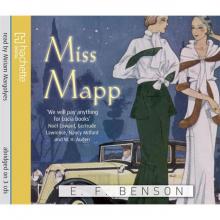 Miss Mapp
Miss Mapp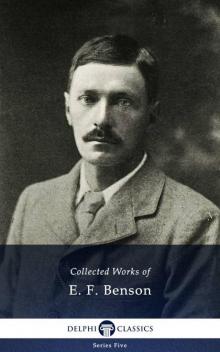 Works of E F Benson
Works of E F Benson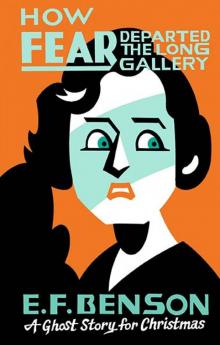 How Fear Departed the Long Gallery
How Fear Departed the Long Gallery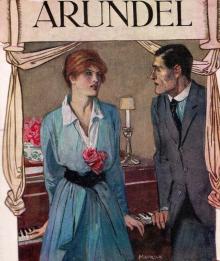 Dodo's Daughter: A Sequel to Dodo
Dodo's Daughter: A Sequel to Dodo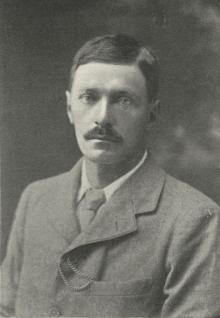 The House of Defence v. 1
The House of Defence v. 1 Queen Lucia
Queen Lucia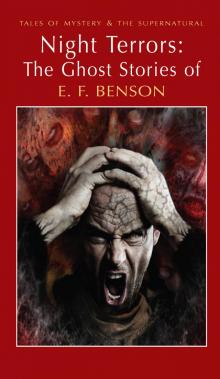 Night Terrors
Night Terrors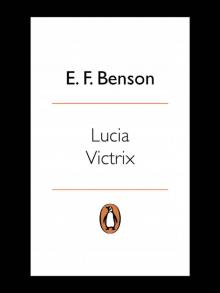 Lucia Victrix
Lucia Victrix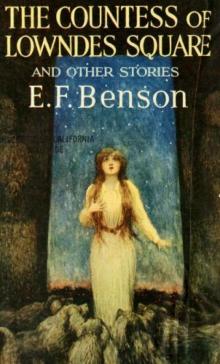 The Countess of Lowndes Square and Other Stories
The Countess of Lowndes Square and Other Stories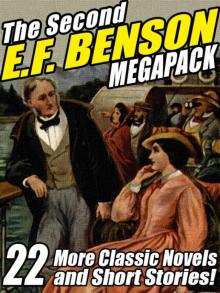 The Second E. F. Benson Megapack
The Second E. F. Benson Megapack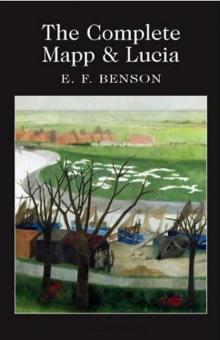 The Complete Mapp & Lucia
The Complete Mapp & Lucia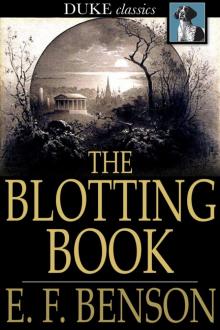 The Blotting Book
The Blotting Book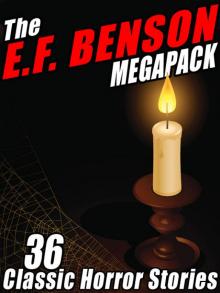 The E. F. Benson Megapack
The E. F. Benson Megapack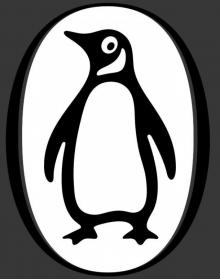 Lucia Rising
Lucia Rising Ghost Stories
Ghost Stories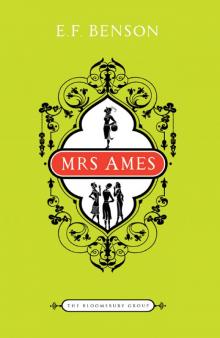 Mrs. Ames
Mrs. Ames E. F. Benson
E. F. Benson